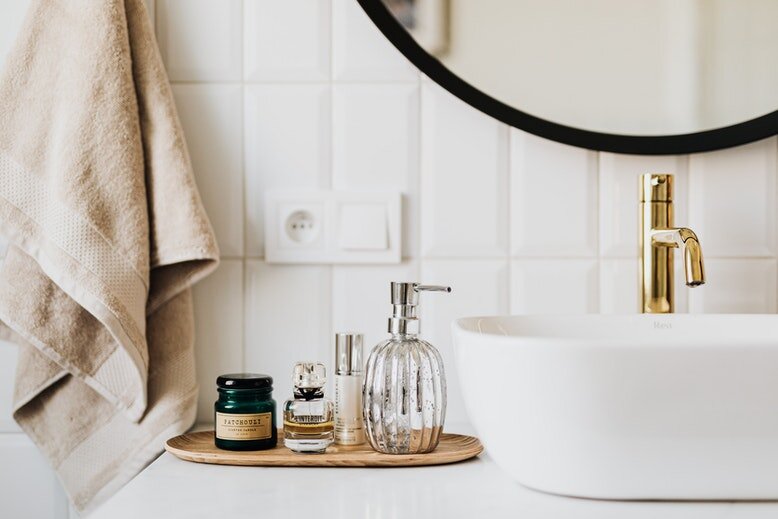When it comes to all things beauty, nothing is more important than maintaining good hygiene. From the tools we use to apply products on our faces to the skincare ingredients that refresh our complexions, antibacterial beauty products have been finding their way on to our shelves and vanities without us consciously knowing. So if you’re curious to know what it's all about, read on.
It’s found in skincare ingredients
You may or may not be surprised that antibacterial beauty products, at least in skincare, are defined by the ingredients found in the formula. Common ingredients such as tea tree oil, rosehip oil, and benzoyl peroxide have antibacterial properties which your skin could benefit from.
The biggest perk of using antibacterial beauty products, especially in skincare, is treating or preventing acne and other similar bacterial skin infections. Antibacterial skincare can help keep the skin’s microbiome — composed of both good and bad bacteria — in check.

Antibacterial skincare ingredients can help control acne problems, among other skin conditions. (Photo from: Karolina Grabowska via Pexels)
One of the most popular natural antibacterial ingredients in skincare is tea tree oil, known for its effectiveness in treating acne. Numerous studies have revealed that tea tree oil is highly effective in preventing the growth of bacteria, even in low dosages.
Another skincare ingredient you may be familiar with is benzoyl peroxide. It’s a little harsher on the skin, as benzoyl peroxide acts to destroy the acne-causing bacteria called P. acnes as well as fungi and viruses.
Rosehip oil is one more notable ingredient with antibacterial benefits as well as antifungal and antiviral ones too. Products with rosehip oil could be good for eczema-prone skin since it’s capable of “re-hydrating the skin as well as preventing infections commonly seen in eczema” said Dr. Suneel Chilukuri to Women’s Health Magazine.
There are also soaps that contain antibacterial active ingredients, such as triclosan and triclocarban, but these are yet to be proven more effective than regular soap or safe to use daily.
It’s also in skincare tools
Aside from skincare ingredients, there are antibacterial skincare tools as well. Facial cleansing tools, in particular, are quite popular add-ons for their claims of providing a deeper and more thorough skin cleansing as well as limiting bacterial transfer from your hands to your face. These tools help remove dirt, oil, and makeup which can cause breakouts. Another benefit is these can also exfoliate, removing dead skin cells to reveal the younger skin beneath while also stimulating blood flow.
When it comes to buying such beauty tools, especially facial brushes, check to see if it’s made of silicone which is less porous than nylon. Porous materials leave holes where bacteria can fester and do more harm for your skin in the long run. Still, these tools are only as clean as you maintain them. Make sure to thoroughly rinse and dry your skincare tools after every use.
There are antibacterial makeup tools too
Some makeup tools can be antibacterial too, to an extent. Similar to skincare tools, bacteria can build up in makeup brushes and sponges which is why it’s important to deep clean your tools at least once a week.
According to Glossy, in 2020, the search for “antimicrobial” reached astounding heights in March and April in the US as a reaction to the COVID-19 pandemic. Prior to that, there were also studies that exposed the high likelihood (up to 79 to 90 per cent) of bacterial build-up in makeup sponges and other cosmetic tools. However, it’s not a big surprise given that bacteria thrive in moist environments such as damp sponges and makeup brushes with residual liquid products.
In response to this, there are makeup brands that offer products with supposed bacteria-fighting benefits. For example, Clinique uses antibacterial technology in one of their makeup brush collections. Essentially, the brush bristles were coated with an invisible antimicrobial solution that kills bacteria. Quite ideal for people who don’t have the time to religiously deep-clean or wash their personal makeup brushes. There are also alternatives to makeup sponges, but often these sacrifice efficacy and environmental-friendliness in lieu of being less absorbent.
So are antibacterial beauty products a must-have? They're not really a necessity, especially when it comes to beauty tools. These are perks, indeed, but nothing that can’t be achieved with proper hygienic practises. When it comes to antibacterial skincare ingredients, though, we should only use these if our skin need them. It's always best to proceed with caution — you never know what can upset the balance and trigger a negative skin reaction. When in doubt, always consult a dermatologist.
(Cover photo from: Karolina Grabowska via Pexels)
While you're here, get to the zit-zapping skincare ingredient called azelaic acid.
Comments, questions or feedback? Email us at [email protected].


_SPF_50_Cover.jpg)





